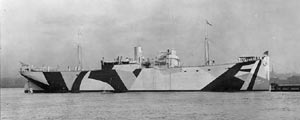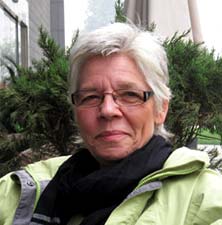Excerpt from Oscar of Between, Part 2
by
Betsy Warland
Oscar. Divesting.
Odds of survival. Her body insisting upon.
Oscar: disengaging from societal preoccupation with.
Over which the bra still reigns.
Deftness of hand unlocking.
Insatiable greed for
: the spilling out.
Hands on.
Mouth acquiring.
Breasts enlisted.
The meaning of “Mine.”
Who has the upper hand?
~~~
Oscar, initially subtitled “A Story of Failures.”
Several writer-friends recoiled, said “No one will want to read it with a title like that.”
The longer she lives, the more interested Oscar becomes in failure — what we consider it to be.
How so often it’s the unnamed force that shapes story.
~~~
Cubism’s dramatic escape from representational art.
Its quiet “borrowing” from African art.
First World War. The story tyrannizes us until it is understood.
Desperate realities made present in one painting; one sculpture. Mono-vision made askew with different points of view.
Splitting on a scale never previously encountered. First World War. Story tyrannizes until it is understood.
Splitting of Adam’s chest/rib into Eve. Splitting of atom/in the wings.
1907 = Cubism’s first painting
: Les Demoiselles d’Avignon
/Picasso’s angles on five female nudes/
(veneer of Venus stripped away).
Disruptive Pattern on British warships
: 1914. A line crossed.
World War One
: first large-scale encounter with The Other.
Cubism — first encounter with the other within,
and Other shockingly close at hand.

USS Federal, Wikipedia
~~~
Camouflage “the art of survival.” Humans ever at risk: no blending-in fur, feathers, scales. Human’s “natural protection?” Outsmarting predators.
Oscar comes across snapshots of her in 4-H Club uniform. Shoulder-width sailor’s collar, plain blue dress, men’s tie-shaped white bow extending to arms, sensible white flats.
Oscar’s face
: sullen. No
eye contact.
4-H for rural kids: Head, Heart, Hands, Health. “I pledge my head to clearer thinking …”
Thinking, however, in Oscar’s case suspect.
The Better Grooming Contest. Difference between training and taking pleasure in.
Submission. Oscar her mother’s project. Sensation of paper doll’s wardrobe tabs clamping down on her body.
The judges — three other mothers. Prim with quiet scores. To settle.
Oscar standing. In church basement activities room. Feet together.
Attempting polite conversation as if. Their hands alternatively inspecting her.
Ticking off ratings on form.
Hair (score?). Accessories (score?). Dress (score?). Nails (score?).
Shoes (score?). Hose (score?). Girdle (score?). Slip (score?).
Bra (score?). Underpants (score?).
What this felt like. The terms for this? There are none.
Oscar winning second prize. Her mother’s disappointment.
Oscar’s shame. Migrating into clamped-down anger. For tears alienate even more.

Guest Writer:
Susan Crean
Toronto, ON
https://www.susancrean.ca/
November 1911
The official, face half obscured in a bushy, red beard, peers at the short, slight young man in front of him and sees a boy. With a scratchy pen he makes notes on a sheet of paper starting with the young man’s name and birthplace. These Won Cumyow, the Chinese interpreter standing quietly beside him, pronounces slowly in English. “Wong Jong Wong,” says Cumyow. ” San Jay, Sunna.” The nib squirts ink across the fresh paper and the Beard curses as he reaches for the blotter.
“Height?” he barks. “Four foot nine” comes the answer.
“Distinguishing features?” Cumyow follows the routine.
“Pits on forehead, and right eyebrow.” “Occupation?” Cumyow speaks again to the young man, the thirty-fourth Chinese passenger he’s interviewed so far. The answers are monosyllabic, as always. Accompanied by that curious look of determination and terror he’s come to recognize. “Labourer,” he says.
“Age?” “Sixteen.” The Beard looks up.
“Not possible,” he exclaims and points to the back of the young man’s head, nodding to the assistant with the measuring stick who approaches the youth, picks up his pigtail and places it along the wooden scale. “Thirteen inches,” he reads out.
“Well, that would make him about eleven, wouldn’t it?” asks the Beard, writing in the figure on the form without waiting for an answer. Cumyow says nothing.
“What did he say for occupation?”
“Would have to be a student.”
It is the interview with immigration that everyone dreads. He’s heard about the cheat sheets that paper sons memorize to fool the authorities. But you cannot predict what the authorities will ask, or what they will believe. Even legitimate sons make mistakes, are refused and turned back. What are the odds they’ll let him stay? The man called Cumyow continues his questioning: Where was his last domicile? “Hong Kong.” Where does his uncle reside? “Vancouver.” What does he do? Wong repeats the address and recites the story of Wong Wanshen opening a restaurant on Victoria Drive with two friends. He listens to Cumyow’s abbreviated translation. Then, suddenly the Beard is handing him a piece of paper.
Unsure what it means, he glances at Cumyow who explains this is his immigration certificate, warning him not to lose it. Cumyow is an elegant middle-aged man, who seems at ease with the Beard and with English, as if he’d been born here. Yet, he speaks Taishanese. Wong listens as Cumyow reassures him that he has been reclassified as a student so he will be allowed to stay. “You are a student, no? Well, make a point of becoming one. My advice to you is to learn to read, and learn English.”




Betsy & Susan,
What a delight it was to read these pieces.
Oh life and all its rules, all the places someone else has control and as a young person we try to measure up. In both pieces they are being assessed. A checklist is over their head. Oscar knows what the checklist is and in the case of the young man immigrating he does not know what they will ask, what they will want to know or how to answer correctly. Both wonder will they be accepted into the “club”. For one it is to be with a parent who is not really their parent; a paper son in need of a “better” future. For the other not wanting to disappoint a parent who cannot see them, a parent who clearly wishes to remake them… so in a sense they are both being made over into something new, something perhaps unlike themselves. If they don’t there is a cost, rejection…
Thank you,
Jonina
i re-enter this story of Oscar of Between and am startled. something i recognise. because i know the writer as a friend and writing mentor off the page? no, something else, something ‘other’ we’re all afraid of. i’m sure, we’re all afraid of. the terse phrases make me breathe differently as i read on the screen. i hear them land with staccato punch. a slow sharp dawning. we’re all the other, that other we’re afraid of. and here susan crean’s excerpt from Digging to China: The Search for Wong Dong Wong (1895-1970) dovetails the other text so neatly. a scene so vivid. does the other measure up?
Girlguides and 4H – you nailed it succinctly – and poetically. Camouflage sometimes are those nets thrown over tanks or in my case bird blinds. The inside and outside of it – has a mother/dresser/thrower of the net ever come to her senses and written about this from the outside and rued or celebrated the intent of it all?
‘Who has the upper hand?’ These two pieces touched so much in me, both as a daughter of immigrants and as a writer. What does language reveal? What it possibly cannot and how we try as writers to convey the ineffable. Oscar’s interest in failure and how so often it is the unnamed force that shapes story. So is the unspeakable the force that shapes us and story. Failure and surrender, two very loaded words that carry mountains of stories within the syllables. The two pieces fit so well together in such a contrasting manner. Great work to both of you. Thanks for sharing. I enjoy reading these adventures of Oscar and the writers who respond.
Okay, this is the first time I’ve done this – leave Comments on-line – so bear with me. What I really want to do is put my comments in red between Betsy’s lines but I can’t figure out how to do that short of cutting and pasting the whole thing into this box…So I’ll just go ahead with my jottings, as I wrote them on the print-out (I need to read from paper for something really to sink in).
I’m not a regular reader of poetry so I have to get used to the poetic line, for example, in reading Oscar, learn to stop needing meaning after the preposition (hmmm, I can see there’s no way to italicize or bold words in this format: I want to emphasize the “after”). Learn to just stop with the line…Those opening lines about breasts and bras: whoo! whew!…that “failure” is an “unnamed force” behind a story is an incredibly provocative thought that gives me all kinds of ideas for my own work…the observation about Picasso’s escape from representational art made me think immediately of the Byzantine icon, a genre that never did go there, never mind escape from the representational; and I wouldn’t think P’s “borrowing” from African art was quiet but rather noisy actually, at least I imagine that there was quite a vociferous reaction from the public seeing his “borrowings” for the first time; and I am also wondering if at any time P harkened back as well to that Late Medieval period in Western art when the Byzantine began to yield to the representational, as with Giotto Check out this link: http://www.metmuseum.org/toah/hd/iptg/hd_iptg.htm#slideshow1
I couldn’t help comparing Oscar’s observations about the skewing of the monovision with the experiments of the revolutionary artists of the early Soviet Union, such as the photography of Rodchenko, the “squares” of Malevich, the (Cubist, Suprematist and Constructivist), painter and designer, Lybov Popova: take a look here
http://en.wikipedia.org/wiki/Liubov_Popova:
Now, I got tripped up in the next sequence about splitting, as I don’t know how Oscar gets from Adam & Eve (in just one of the Biblical versions of Creation) way over to splitting atoms in a couple of keystrokes. But when I got to the “disruptive pattern” on British warships, I scribbled down: “Ah ha, I know where this is going.” Meaning camouflage. (And Betsy, I remember the walk we took through that cemetary in Stoke-Newington when I first heard of the camouflage obsession). But just before Oscar goes there, s/he makes this brilliant point about what Picasso had done, “Cubism – first encounter with the other within.” But just before that line, I scribbled notes in reaction to the “first large-scale encounter with The Other” that WW I represented; I scribbled: Crimean War, Balkan Wars & the Ottoman Empire, not to mention the violent assaults of Empire on India, central and southern Africa, Tasmania, Newfoundland, Bolivia, Mexico, and the Canadian West. Quite a few Others there!…I join the admirers of the 4 H Club anecdote but I wanted to know how Oscar felt about the rest of the pledge s/he made, the heart and the hands?…As for the judges with scores to settle, I jotted: Hmmm. Meaning: Huh?…As for the final lines, I have to admit wanting to argue with Oscar about the “shame” and “humiliation” of second prize: second is damn good enough, don’t you think? I mean, imagine being the girl who came in last? (I know whereof i speak, being always the last one picked for the softball team at recess; on the other hand, always first to be picked for the spelling bee.) And also, about that “clamped-down anger”: at whom and what? Mother? the stupid contest? one’s own submissiveness? I guess I have to wait for the next installment to find out.
Face turns and in turning faces.
In turning the face faces us with its innumerable subjects.
In subjecting the turn with its faces, an I facets.
The faceted I turns, slips, slopes the saying face, flips its subjects.
Numeral facet: I invents a face. Numeral facet: a face invents its I. Numeral facet: the invention is subjective.
The labyrinth of the body, the lab of being, of wordmatter, its curvature, curving word to fold its subject, the animal curvature pleats of a subjective dermis, the vibrating labyrinth, oscillating.
Threshold: a point of entry or beginning; an intensity or magnitude that must be exceeded for a phenomenon to occur; the maximum level considered safe; the limit below which there is no reaction. Threshold: an entry and thus an opening to a possibility of understanding, the will to make happen, a generous openness to another; also to be surpassed, to go beyond, a limit crossed; the possibility of harm; the possibility of stasis or indifference.
Dear Jonina, Ingrid, Marilyn, Tina, Myrna and Oana,
Can’t thank you enough for your comments about Susan’s and my excerpts posted in the March Oscar’s Salon.
Individually and collectively, there’s an intriguing kinetic reaction of thought, knowledge contexts, imagination and heart set in motion that further animates our texts: opens them out to surprise and even more thought-provoking meaning.
Elating! Comes close to rivalling the act of writing itself
Betsy aka Oscar
The greed: there is so much greed.
Whoever is different becomes the natural prey.
Fascinating, beautiful shattering incorporated with painting.
Very sad for child.
Was left curious to understand why tears were more alienating than anger and to whom? And inwardly or out, or both?
Yes! I think so many writers and artists are so much more interested in thinking about ‘failure’ rather than ‘success’ (Oscar Part 2) or failure as success! as Judith Halberstam so succinctly put it: ‘In her book ‘The Queer Art of Failure’ Judith Halberstam offers alternative ways of knowing and becoming. Instead of valuing the conventional paths of belonging, achievement and completion, she thinks about and champions the ways of “failure”: losing your way, giving in, being excluded, forgetting, awkwardness, coming apart. Not just rejecting the “normal,” Halberstam shows alternatives to success as paths that have always been there, moving away from mastery and coherence.’
In a series of questions that Dina Del Bucchia of Poetry is Dead put to contributors to their 2011 queers issue. You can read my responses here:
http://poetryisdead.ca/node/106
and a whole series of authors responses to Queers Fail Better if you just google: queers fail better poetry is dead
(Sorry i can not locate a central index for them on PiD)
Meg Torwl
Oscar: disengaging from societal preoccupation with.
Over which the bra still reigns.
Insatiable greed for : the spilling out..
We women work so hard
to make ourselves small
The harness/bra a daily reminder
That like Wong Jong Wong
we must not spill out
we must know our place
And for largeness and softness
There is no place
Not yet.